編輯點評:2019年6月四級真題pdf+word,還有三套真題答案解析和聽力
很多在2019年6月考過英語四級的朋友都說那次的四級寫作對于考生的考查確實是刷出了新高度。雖然給出了三個選擇,但都要求用新聞報道的問題進行寫作,有沒有那么多話寫尚未可知,能不能符合格式都夠人忖度良久,可謂是讓人“欲哭無淚”。這里附上同期的真題三套和答案及聽力,需要的自取。

2019年6月英語四級真題及答案電子版內(nèi)容概括
2019年6月四級真題第一套.docx
2019年6月四級真題第二套.docx
2019年6月四級真題第三套.docx
2019年6月份四級(第一套)試題.pdf
2019年6月份四級(第二套)試題.pdf
2019年6月份四級(第三套)試題.pdf
2019年6月份四級(第一套)答案解析.pdf
2019年6月份四級(第二套)答案解析.pdf
2019年6月份四級(第三套)答案解析.pdf
2019年6月份四級解析(全三套).pdf
2019.6四級第一套.m4a
2019.6四級第二套.m4a
2019年6月英語四級真題及答案電子版圖片預覽
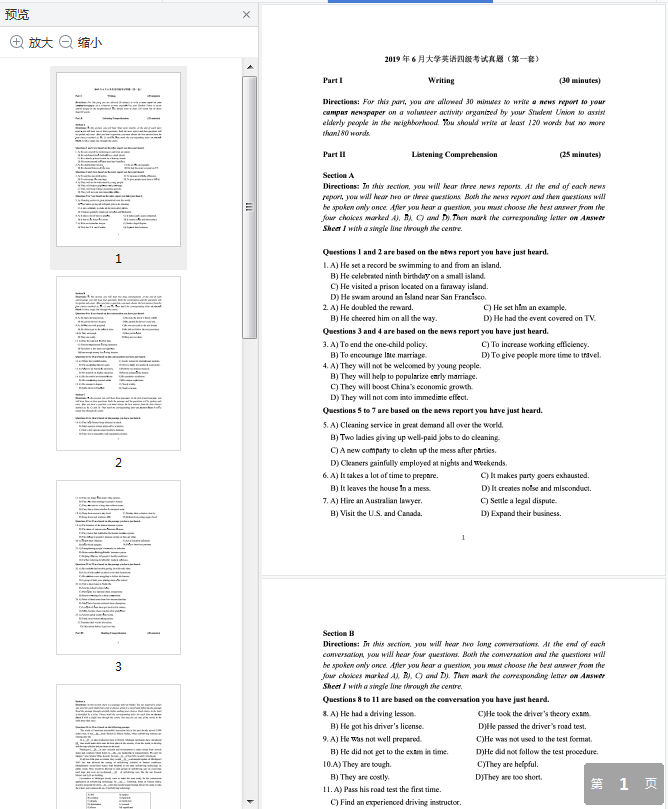
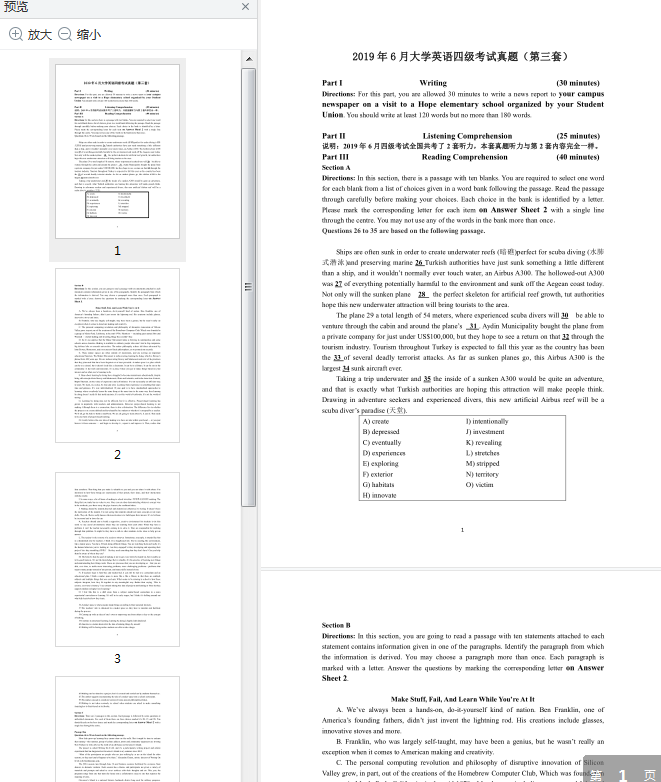
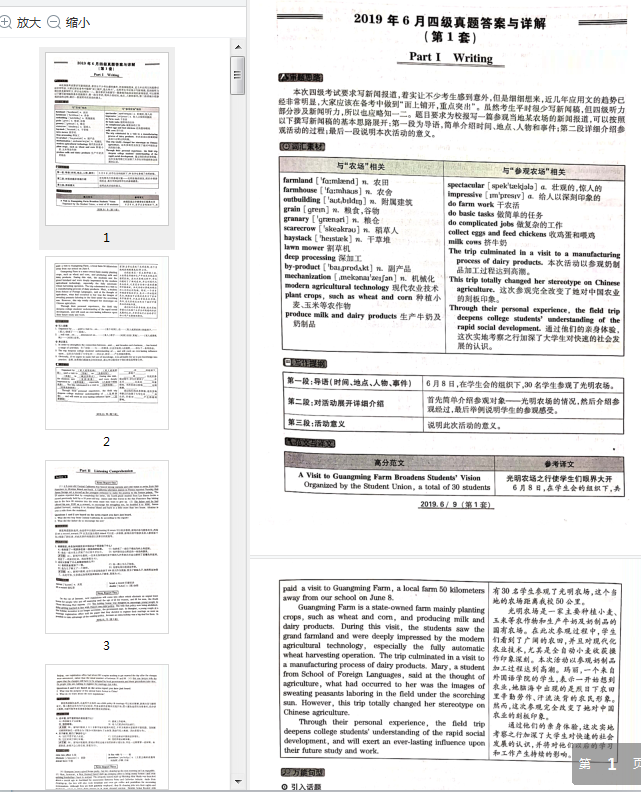
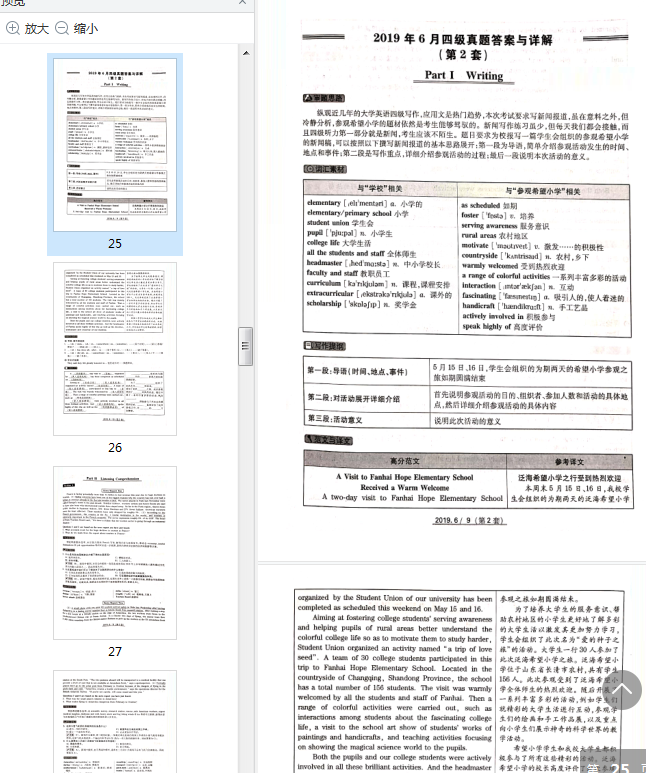
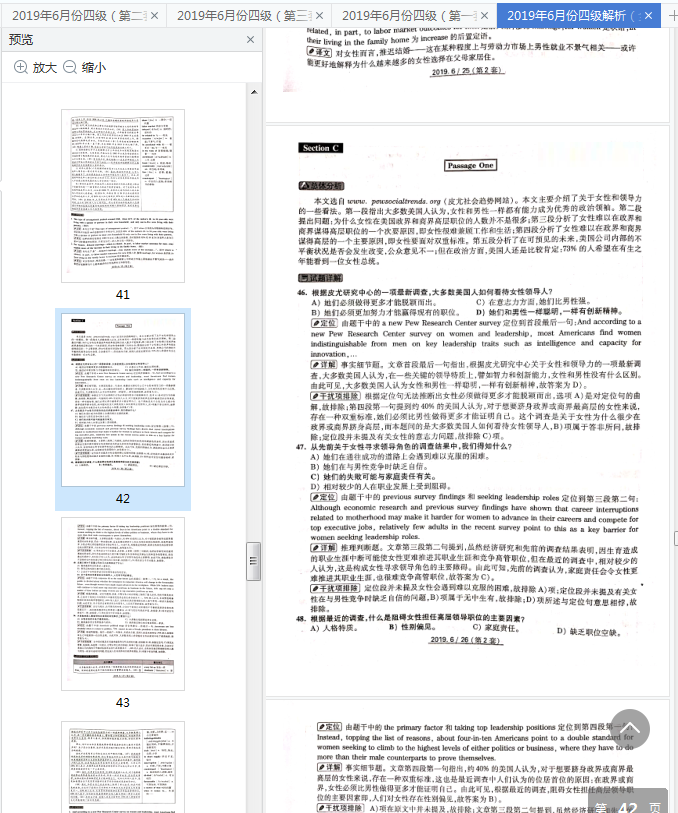
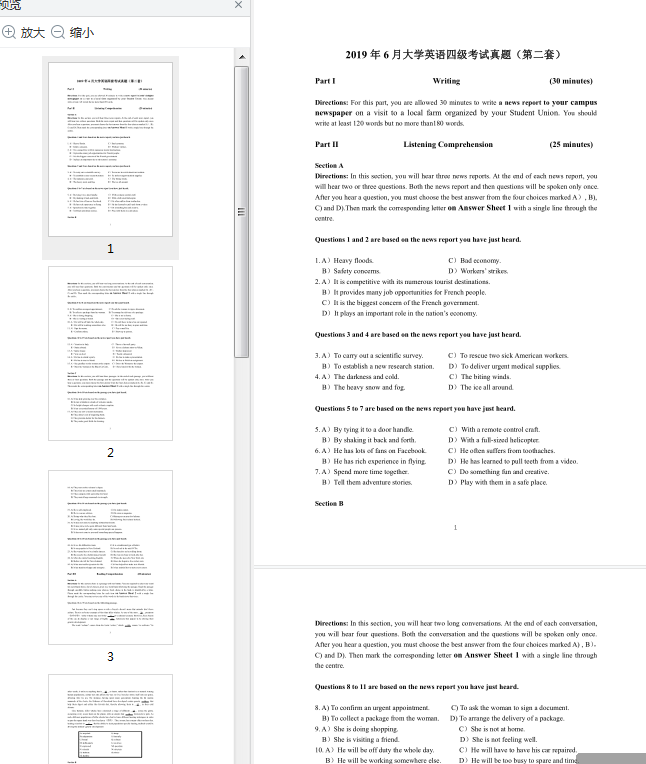
真題預覽
Section B
Directions:?In this section, you are going to read a passage with ten statements attached to it. Each statement contains information given in one of the paragraphs. Identify the paragraph from which the information is derived. You may choose a paragraph more than once. Each paragraph is marked with a letter. Answer the questions by marking the corresponding letter on?Answer Sheet 2.
How Work Will Change When Most of Us Live to 100
A) Today in the United States there are 72,000 centenarians(百歲老人).Worldwide, Probably 450,000. If current trends continue, then by 2050 there will be more than a million in the US alone. According to the work of Professor James Vaupel and his co-researchers, 50% of babies born in the US in 2007 have a life expectancy of 104 or more. Broadly the same holds for the UK, Germany, France, Italy and Canada, and for Japan 50% of 2007 babies can expect to live to 107.
B) Understandably, there are concerns about what this means for public finances given the associated health and pension challenges. These challenges are real, and society urgently needs to address them. But it is also important to look at the wider picture of what happens when so many people live for 100 years. It is a mistake to simply equate longevity (長壽) with issues of old age. Longer lives have implications for all of life, not just the end of it.
C) Our view is that if many people are living for longer, and are healthier for longer, then this will result in an inevitable redesign of work and life. When people live longer, they are not only older for longer, but also younger for longer. There is some truth in the saying that “70 is the new 60” or “40 the new 30.” If you age more slowly over a longer time period, then you are in some sense younger for longer.
D) But the changes go further than that. Take, for instance, the age at which people make commitments such as buying a house, getting married, having children, or starting a career. These are all fundamental commitments that are now occurring later in life. In 1962, 50% of Americans were married by age 21. By 2014, that milestone(里程碑)had shifted to age 29.
E) While there are numerous factors behind these shifts, one factor is surely a growing realization for the young that they are going to live longer. Options are more valuable the longer they can be held. So if you believe you will live longer, then options become more valuable, and early commitment becomes less attractive. The result is that the commitments that previously characterized the beginning of adulthood are now being delayed, and new patterns of behavior and a new stage of life are emerging for those in their twenties.
F) Longevity also pushes back the age of retirement, and not only for financial reasons. Yes, unless people are prepared to save a lot more, our calculations suggest that if you are now in your mid-40s, then you are likely to work until your early 70s; and if you are in your early 20s, there is a real chance you will need to work until your late 70s or possibly even into your 80s. But even if people are able to economically support a retirement at 65, over thirty years of potential inactivity is harmful to cognitive(認知的) and emotional vitality. Many people may simply not want to do it.
G) And yet that does not mean that simply extending our careers is appealing. Just lengthening that second stage of full-time work may secure the financial assets needed for a 100-year life, but such persistent work will inevitably exhaust precious intangible assets such as productive skills, vitality, happiness, and friendship.
H) The same is true for education. It is impossible that a single shot of education, administered in childhood and early adulthood, will be able to support a sustained, 60-year career. If you factor in the projected rates of technological change, either your skills will become unnecessary, or your industry outdated. That means that everyone will, at some point in their life, have to make a number of major reinvestments in their skills.
I) It seems likely, then, that the traditional three-stage life will evolve into multiple stages containing two, three, or oven more different careers. Each of these stages could potentially be different. In one the focus could be on building financial success and personal achievement, in another on creating a better work/life balance, still another on exploring and understanding options more fully, or becoming an independent producer, yet another on making a social contribution. These stages will span sectors, take people to different cities, and provide foundation for building a wide variety of skills.
J) Transitions between stages could be marked with sabbaticals (休假) as people find time to rest and recharge their health, re-invest in their relationships, or improve their skills. At times, these breaks and transitions will be self-determined, at others they will be forced as existing roles, firms, or industries cease to exist.
K)A multi-stage life will have profound changes not just in how you manage your career, but also in your approach to life. An increasingly important skill will be your ability to deal with change and even welcome it. A three-stage life has few transitions, while a multi-stage life has many. That is why being self-aware, investing in broader networks of friends, and being open to new ideas will become even more crucial skills.
L)These multi-stage lives will create extraordinary variety across groups of people simply because there are so many ways of sequencing the stages. More stages mean more possible sequences.
M)With this variety will come the end of the close association of age and stage. I n a three-stage life, people leave university at the same time and the same age, they tend to start their careers and family at the same age, they proceed through middle management all roughly the same time, and then move into retirement within a few years of each other. In a multi-stage life, you could be an undergraduate at 20, 40, or 60; a manager at 30, 50, or 70; and become an independent producer at any age.
N)Current life structures, career paths, educational choices, and social norms are out of tune with the emerging reality of longer lifespans. The three-stage life of full-time education, followed by continuous work, and then complete retirement may have worked for our parents or even grandparents, but it is not relevant today. We believe that to focus on longevity as primarily an issue of aging is to miss its full implications. Longevity is not necessarily about being older for longer. It is about living longer, being older later, and being younger longer.
36. An extended lifespan in the future will allow people to have more careers than now.
37. Just extending one’s career may have both positive and negative effects.
38. Nowadays, many Americans have on average delayed their marriage by some eight years.
39. Because of their longer lifespan, young people today no longer follow the pattern of life of their parents or grandparents.
40. Many more people will be expected to live over 100 by the mid-21st century.
41. A longer life will cause radical changes in people’s approach to life.
42. Fast technological change makes it necessary for one to constantly upgrade their skills.
43. Many people may not want to retire early because it would do harm to their mental and emotional well-being.
44. The close link between age and stage may cease to exist in a multi-stage life.
45. People living a longer and healthier life will have to rearrange their work and life.
2019年6月英語四級作文真題范文
2019年6月英語四級真題作文參考范文:參觀養(yǎng)老院
【四級真題作文題目】:
“For this part, you are allowed 30 minutes to write a news report to your school newspaper on a volunteer activity organized by yous Student Union to help elderly people in the neighborhood. You should write at least 120 words but no more than 180 words.”
【四級真題作文參考范文】
On June 14, Friday, a volunteer activity where many students took an active part in visiting the local Nursing House was organized by the Student Union and it turns out to be a big success.
The activity was aimed at encouraging students to visit the elderly at the Nursing House and help elderly people deal with their troubles both physical and psychological. Many students volunteered to participate in this good deed and were engaged in helping the elderly here out by making their meals, washing their clothes and chatting with them. When asked about those volunteers’ feelings about such an experience, all of them responded with a smile, saying “what a wonderful practice and I really appreciate this experience, for it makes me learn to care more for others in need.”
All in all, the activity turns out to be a success not only for the visited elderly but for those students involved.
【四級真題作文參考范文譯文】
6月14日,星期五,學生會組織了一個參觀當?shù)鼐蠢显旱闹驹富顒樱S多學生都積極參與其中,該活動取得了巨大的成功。
此次志愿活動旨在拜訪當?shù)鼐蠢显旱睦先藗儾λ麄兏鱾€方面的困難提供幫助。許多學生主動加入到此次善舉當中,幫老人們洗衣做飯、談心解悶,竭盡所能提供幫助。問及參與此次活動的感想時,他們毫無例外地回道“真是太有意義了,很感謝這次經(jīng)歷,它讓我懂得要去更加關愛那些有困難的人”
總而言之,此次活動取得了巨大成功,不僅僅對那些老人來說受益多多,對于參與的學生來說也是意義良多。

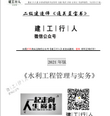 2021年二建水利通關藍寶書
2021年二建水利通關藍寶書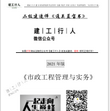 2021年二建市政通關藍寶書在線閱讀
2021年二建市政通關藍寶書在線閱讀 2022考蟲數(shù)學高數(shù)必練1000題pdf
2022考蟲數(shù)學高數(shù)必練1000題pdf 黃岡歷年中考物理試卷及答案解析2007-2020年整合版
黃岡歷年中考物理試卷及答案解析2007-2020年整合版 黃岡市中考化學試卷2012-2020年整合版
黃岡市中考化學試卷2012-2020年整合版 黃岡中考英語試卷及答案2007-2020整合word版
黃岡中考英語試卷及答案2007-2020整合word版 黃岡數(shù)學中考試卷及答案2011-2020年整合版
黃岡數(shù)學中考試卷及答案2011-2020年整合版 計算機畢業(yè)設計:ASP語言設計完整版
計算機畢業(yè)設計:ASP語言設計完整版 2021年中國95后女性洞察報告pdf免費在線閱讀
2021年中國95后女性洞察報告pdf免費在線閱讀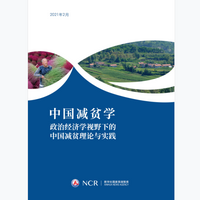 中國減貧學報告電子版免費在線閱讀
中國減貧學報告電子版免費在線閱讀








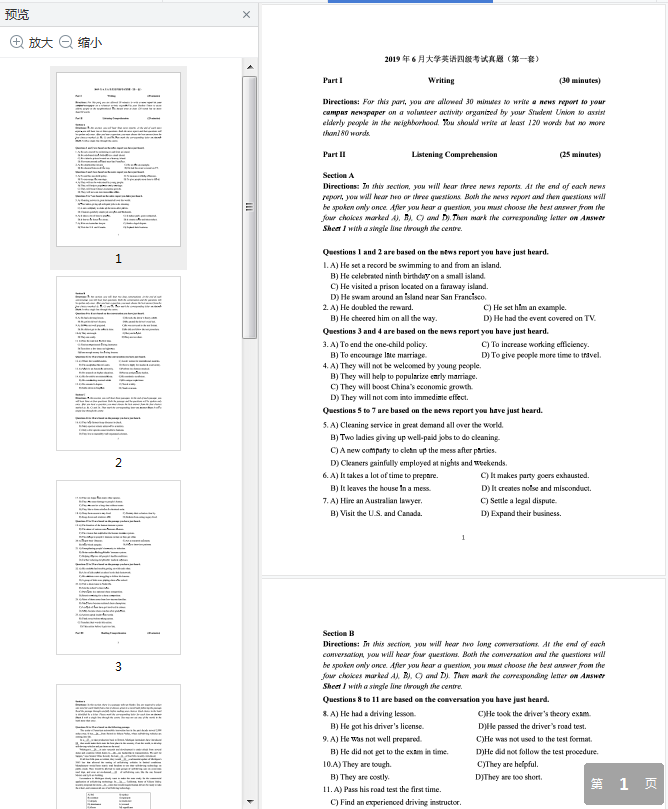
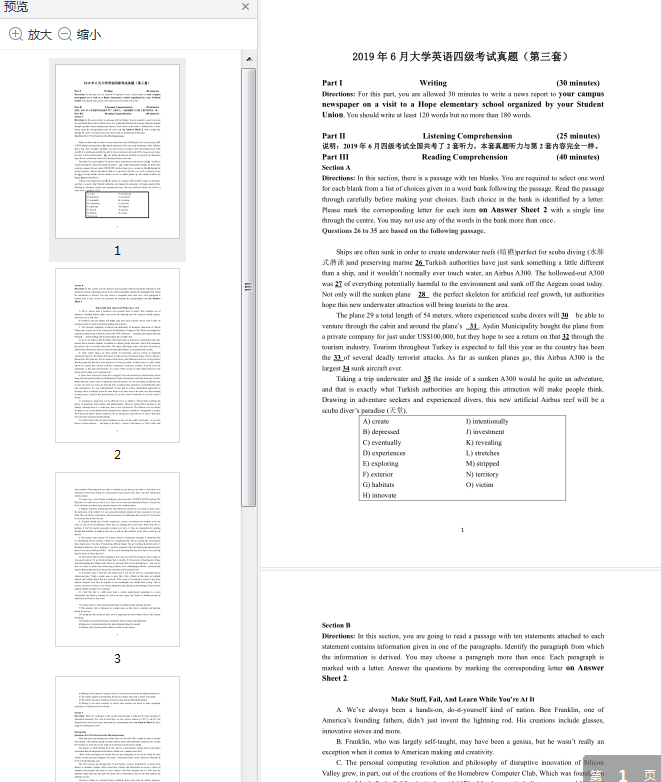
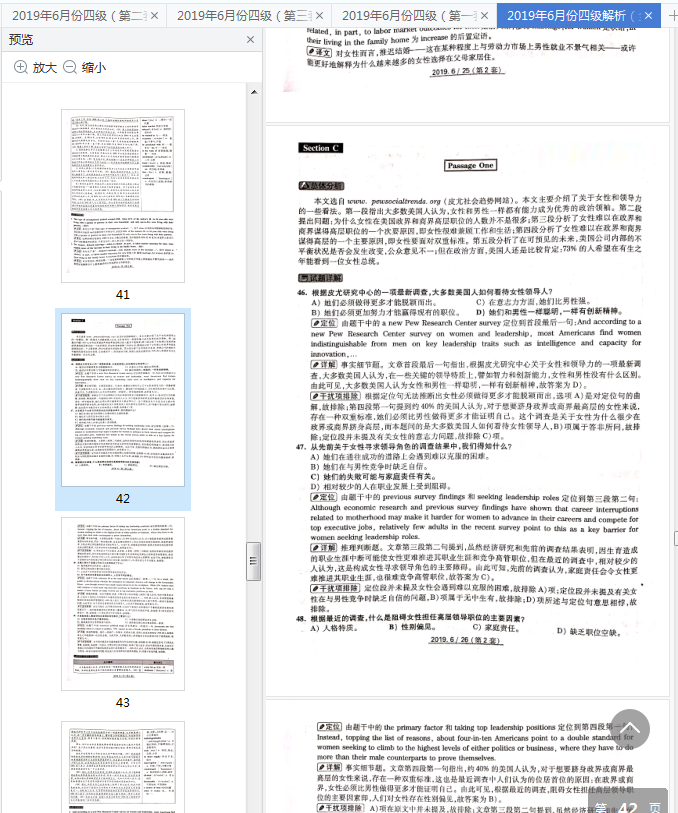
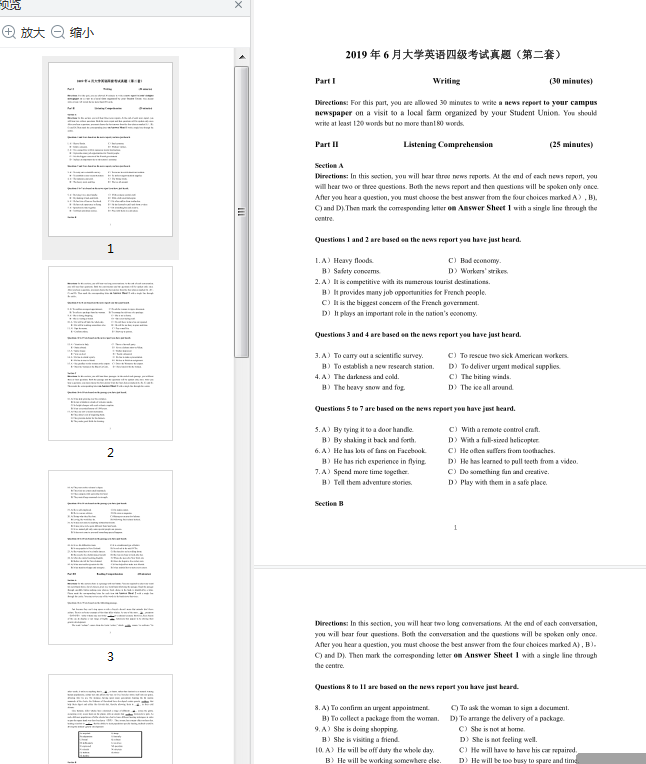



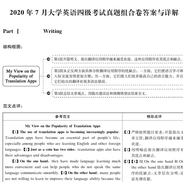
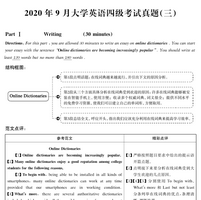
 黃岡歷年中考試題及答案解析2012-2020年語文試卷word無水印版
黃岡歷年中考試題及答案解析2012-2020年語文試卷word無水印版 幼兒園綜合素質(zhì)學習筆記pdf電子版完整版
幼兒園綜合素質(zhì)學習筆記pdf電子版完整版 幼兒園保教知識與能力學習筆記pdf電子版免費版
幼兒園保教知識與能力學習筆記pdf電子版免費版 小學教育教學知識與能力學習筆記電子版手寫板
小學教育教學知識與能力學習筆記電子版手寫板 中學綜合素質(zhì)學習筆記在線閱讀完整版
中學綜合素質(zhì)學習筆記在線閱讀完整版 中學教育知識與能力學習筆記pdf電子版免費版
中學教育知識與能力學習筆記pdf電子版免費版 專插本英語詞匯必備3400pdf完整版
專插本英語詞匯必備3400pdf完整版 廣東省專插本必刷2000題政治理論答案電子版免費版
廣東省專插本必刷2000題政治理論答案電子版免費版 2020全國中考物理真題及答案解析合集免費版
2020全國中考物理真題及答案解析合集免費版 2020全國中考英語真題試卷及答案解析整合版
2020全國中考英語真題試卷及答案解析整合版 2020全國中考數(shù)學真題試卷及答案解析匯總大全docx可打印版
2020全國中考數(shù)學真題試卷及答案解析匯總大全docx可打印版 2020全國中考語文真題及解析匯總整合版免費版docx完整版
2020全國中考語文真題及解析匯總整合版免費版docx完整版 數(shù)學物理方程講義完整版1-5講電子版pdf高清無水印版
數(shù)學物理方程講義完整版1-5講電子版pdf高清無水印版 大小: 109.1M
大小: 109.1M



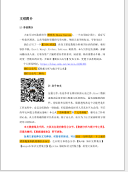










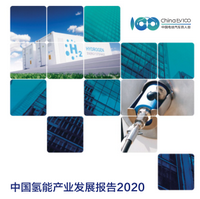

 中考復習資料大全
中考復習資料大全 新高考復習資料合集
新高考復習資料合集 三年級復習資料合集
三年級復習資料合集 二級建造師考試資料大全
二級建造師考試資料大全 數(shù)學題庫文檔
數(shù)學題庫文檔 十二校聯(lián)合教育學基礎第三版筆記和課后習題pdf免費版
十二校聯(lián)合教育學基礎第三版筆記和課后習題pdf免費版
 2021新高考數(shù)學一輪復習真題和模擬題匯編pdf免費下載
2021新高考數(shù)學一輪復習真題和模擬題匯編pdf免費下載

熱門評論
最新評論